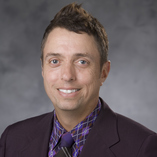 Dr. Richard Bedlack of Duke University Dr. Richard Bedlack of Duke University Amber Hancock-Burns Staff Writer Lou Gehrig’s Disease, or ALS, is a disease that weakens muscles, breaks down the nervous system, and currently has no cure. Although it has no way to fully rid someone of the disease, a doctor at Duke University is testing a new drug called Lunasin, due to it showing signs of reversing the effects of the disease. When someone is diagnosed with ALS, they begin to lose the connection between the brain and muscles, which leads to loss of motor skills and weakness of the arms, legs, and mouth. When one has the disease, they are gradually unable to move, walk, talk or swallow. This loss in simple abilities lead to debilitation, and no one has ever fully recovered. Dr. Rick Bedlack of Duke University wants to do everything in his power to make the disease easier on those who have it. He hopes to eventually find a cure. Bedlack was very surprised in the 1990s by how doctors reacted to the diagnosis and wanted to find a way to do more than just tell the patient “unfortunately, this is what you have, this is what it does to people, and we just don’t have anything we can do about it. So you should go home, get your affairs in order, and we can help you be comfortable, and that’s it.”
He opened the Multidisciplinary ALS Clinic at Duke University in 2001 and hoped that there was at least a chance for patients. Bedlack’s patients are rare cases who have some hope, whom he worked hard to track down. One of his most successful patients is sixty-four year old Mike McDuff. When McDuff was diagnosed in 2012 with ALS, he went home to Massachusetts with his wife and family and started to prepare for his passing. His health started to decline rapidly, and soon he could not speak or swallow and was fed through a feeding tube. When one of McDuff’s friends mentioned Lunasin, a nutritional supplement that claims to have a large amount of health benefits, some of which are believed to reverse the progression of ALS, McDuff jumped at the opportunity to have a chance at progressing his health in the right way. After three months, he started to see results. He “couldn’t put his finger on it but he felt a little better.” One night when his wife was making a large turkey dinner, he asked her to give him a small amount of mashed potatoes and gravy. When McDuff was able to swallow on his own, he began to cry once the realization settled in. Bedlack looks for the patients like McDuff who are rare and have even the slightest chance of improving. Because of Lunasin and all the work Dr. Bedlack has done, Mike McDuff is now able to speak clearly and feed himself. Due to McDuff’s success, Bedlack is starting a pilot trial with fifty patients in order to increase his number of ALS reversals, which is at twenty-four so far. Dr. Bedlack knows that Lunasin will not work for everyone but hopes that at least a few patients can be helped through his work. He and the head of research at the Motor Neuron Disease Association, Belinda Cupid, hope that the clinical trials will help give a new understanding of the ALS, or Motor Neuron Disease, and new chances to gather data about the disease in order to help more and more affected people. Comments are closed.
|
Archives
March 2017
Categories
All
|

